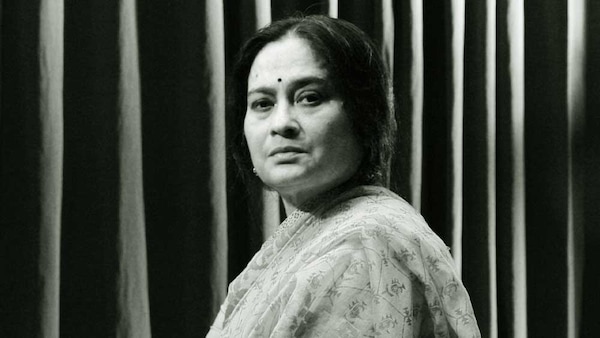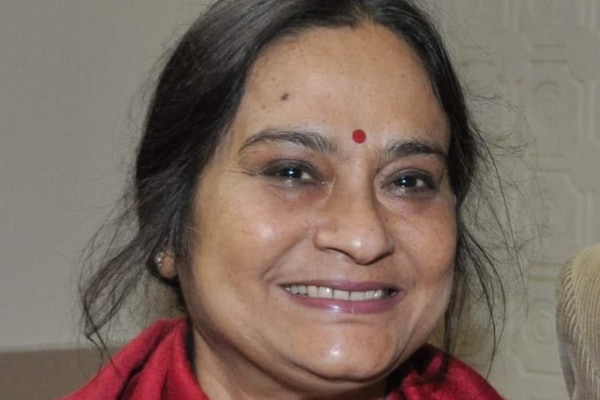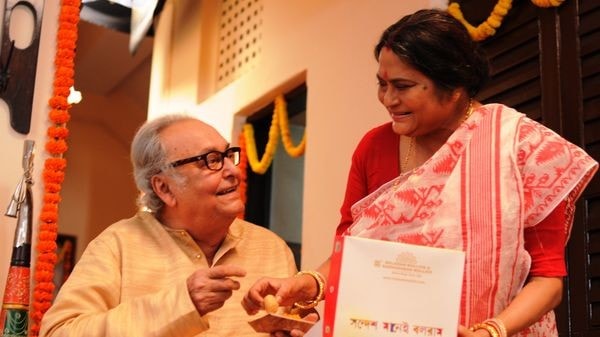RIP Swatilekha Sengupta: A tribute to the veteran actress
The veteran Bengali actress from Satyajit Ray's Ghare Baire passes away at 71.

Last Updated: 04.27 PM, Jun 16, 2021
Swatilekha Sengupta made her on-stage debut in 1970 in Allahabad (now Prayagraj). She also did a short stint as a university lecturer. The turning point in her life came in 1978 when she joined a Bengali Theatre Group called Bohurupee in Calcutta. Soon, she won over discerning audiences and critics alike and scorched the stage with her searing performances. It wasn’t long before cupid struck and she fell in love. Later she went on to marry her mentor- the noted theatre director/actor Rudraprasad Sengupta. Her triumphant journey continued unabated as she rose to become a doyenne with a wide range of histrionics to showcase across a wider gamut of roles that helped her gain more recognition and eventually led to her picking up the prestigious Sangeet Natak Akademy Award in 2011 for her contribution to Indian theatre.
These are just the highlights of her illustrious career. There’s, of course, a lot more to her and about her - of how she catapulted to celluloid fame and left an indelible mark with her memorable onscreen turns.

In 1984, she made her screen debut when she was personally handpicked by none other than Satyajit Ray to essay the role of Bimala opposite Victor Banerjee and Soumitra Chatterjee in the path-breaking film Ghare Baire (The Home and the World), based on the acclaimed novel by Rabindranath Tagore.
Prior to her big screen debut, in 1981, she essayed a small role in Shambhu Mitra's Galileo. And it was this performance that had caught Ray's attention as he was introduced to her talent for the first time. After three months, a call came to the Nandikar office and she was told, “Manikda (as Satyajit Ray was popularly referred to) wants to meet you.”
Subsequently, the meeting happened. But that memorable day itself started out on a difficult note. In a past interview, Swatilekha had recalled how on that very day Calcutta witnessed a complete traffic standstill due to a bustling political rally that chaotically erupted and choked the main arterial roads of the city. She had no other option but to walk all the way from her house on Vivekananda Road (North Calcutta) to his Bishop Lefroy Road residence in South Calcutta. It was an almost marathon effort and took the actress two-and-a-half hours to reach her destination.
Despite the excruciating ordeal, she managed to reach thirty minutes prior to the scheduled appointment. After settling down on the sofa and regaining her composure when she declared her proficiency with the piano, Ray asked her to try her hands at the one in his room. She played a Beethoven piece and Ray was mighty impressed. He had found his ‘Bimala’.
And thus a new and eventful chapter unfolded in her life.

There is a long history about the making of Ghare Baire (1985). During the 1960s Ray had earmarked Soumitra to play Nikhilesh – the obvious choice given his good looks and the romantic screen image he had acquired after playing Apu – but when Victor appeared on the scene in the late 1970s, Ray decided to reverse the roles. To play Bimala, a character torn between passion and duty, he had earlier considered Madhabi Mukherjee and also the heart-throb of Bengal, Uttam Kumar’s romantic screen-partner Suchitra Sen. Both actresses he found, in a sense, too attractive for the part; Bimala is a woman of some character, but she is not, according to Tagore, a beauty, notwithstanding the idea of her held by many Bengalis. Ray preferred to have a new face for the part, one which did not fit the public’s stereotype, and in Swatilekha, he found someone who had personality, command of Bengali, and ‘the intellect to understand what she was doing.’
The shooting started. Everything went well until October 1983 when Ray suffered his first heart attack, brought about by a combination of the high blood pressure he had long suffered from and persistent over-work. For nearly a year he would be in and out of the hospital in Calcutta and in Houston, where he underwent bypass surgery in mid-1984. In the meantime, he supervised his son Sandip’s completion of the film in time for the Cannes Festival in May 1984. Swatilekha too attended the festival and was elated at the positive reviews from some quarters of the foreign press and critics given that her acting prowess came under the public glare.
Her experience was transformative after the shooting of Ghare Baire as she had put it well in another interview, ‘I felt like a bud. He (Ray) made me blossom like a flower.’
The Bengali cine lover however had to wait for another thirty years before Swatilekha teamed up with her Ghare Baire co-star Soumitra Chatterjee once again, and made a comeback to the screens. This time to play the role of an elderly wife in the family drama Belasheshe (In the Autumn of My Life, 2015) directed by Nandita Roy and Shibaprasad Mukherjee. The plot dealt with the separation of a couple who are on the verge of celebrating their 50th marriage anniversary and was inspired by a Bengali play which her daughter Sohini Sengupta had directed earlier.

Her impactful performance in the box-office hit drew universal applause from all quarters – including words of genuine appreciation from an unusual admirer and an artist plying the acting trade long enough in the business. Yes, from Amitabh Bachchan- who not only tweeted and wrote in his blog about the film, but even couriered an appreciation letter along with a bunch of flowers to her at her theatre group’s Shyambazar address.
In Belasheshe the wife tells her husband of 50 years that she wished she dies after the death of her husband. Because in the eyes of her dedicated self, she could live without him but he can’t live without her.
Reel-life prophetic dialogues of her indeed became true in real-life. When the reaper came to escort her from life’s banquet, her co-star Soumitra Chatterjee had already passed away almost a year back. Their third and final film which is yet to be released is aptly titled Bela Shuru (The Starting of a New Day.) While the thespians start a new inning somewhere in the heavens, we mourn her absence here on earth. The stage and the studio floor will never be the same again.
